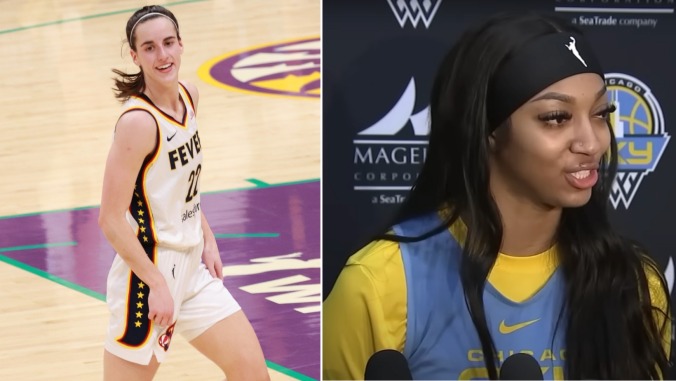It’s Time to Ban Men From Talking About Caitlin Clark, Angel Reese, and the WNBA
Male sports analysts and the most annoying people on the internet are obsessed with painting WNBA players as "petty" and "dramatic" for conflict and rivalries that are typical in all sports. This week, ESPN's Pat McAfee referred to Clark as “the white bitch.”
Photos: Shutterstock In Depth
After breaking seemingly every record that existed throughout her college career, Caitlin Clark made her highly anticipated WNBA debut with the Indiana Fever in May, and the internet has not been normal since.
This is namely due to male sports analysts and men on social media, in general, being obsessed with inserting themselves into any amount of WNBA drama, while also insinuating the women athletes are being uniquely “petty.” If watching the NBA for the last odd decade of my life has impressed anything upon me, it’s that feuds, rivalries, and trading barbs are all run-of-the-mill in sports—but where LeBron James is “competitive” for getting into it with referees or other players, WNBA players who aren’t best friends with Caitlin Clark are “dramatic.”
The events of the weekend only pushed the discourse surrounding Clark to new levels of unbearable. After a controversial, flagrant foul on Clark by the Chicago Sky’s Chennedy Carter on Saturday, an onslaught of social media debate ensued about whether Clark is being unfairly treated by the league, with WNBA players and coaches weighing in. Then, for whatever reason, ESPN’s Pat McAfee—the deeply annoying host responsible for bringing on Aaron Rodgers seemingly every other day last year to make new, outlandish comments—felt the need to insert himself, too.
“What the WNBA currently has is what we like to describe as a cash cow. There is a superstar,” McAfee said on The Pat McAfee Show on Monday. “I would like the media people that continue to say, ‘This rookie class, this rookie class, this rookie class.’ Nah, just call it for what it is—there’s one white bitch for the Indiana team who is a superstar.” (Mind you, around the same time ESPN laid off dozens of its on-air talent in 2023, the network finalized a five-year, $85 million contract with McAfee.) McAfee went on to offer a tepid apology for his words that same day, specifically apologizing for calling Clark a “white bitch”—without any acknowledgment of how reductive, unhelpful, and racist it was for him to lift her up as the majority-Black league’s savior.
Four guys also sitting here not reacting at all btw https://t.co/yvo5O7pl6i
— Prem Thakker (@prem_thakker) June 3, 2024
But before McAfee’s Monday comment, men, and unfortunately men with significant sports media platforms, have refused to be normal about Clark, her role in the WNBA, and how other players are allegedly treating her. “You women out there, y’all petty, man,” Charles Barkley said on-air last month, speaking to WNBA players broadly. “Y’all should be thanking that girl for getting y’all ass private charters, all the money and visibility she’s bringing to the WNBA… bringing all that money and shine to the WNBA.” I am, again, rolling my eyes at the insinuation that female athletes are “petty” as well as the narrative that Clark is singlehandedly saving the league. Former NBA player and current analyst Matt Barnes offered similar commentary, claiming he’s “seen a couple of girls smirk when she’s got knocked down, half-ass to pick her up,” and telling WNBA players on his talk-show All the Smoke that they’ve “got to do better, ladies.” I doubt he’d tell Steph Curry and the Warriors they’ve “got to do better” if they played a particularly physical game against another star player and engaged in shady comments afterward.
-

-

-

-

-

-

-

-

-

-

-

-

-

-

-

-

-

-

-

-

-

-

-

-

-

-

-

-

-

-

-

-

-

-

-

-

-

-

-

-








































